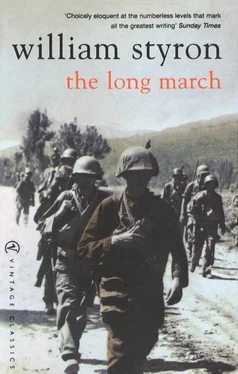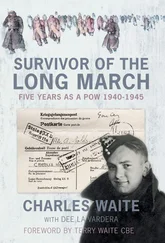William Styron - The Long March
Здесь есть возможность читать онлайн «William Styron - The Long March» весь текст электронной книги совершенно бесплатно (целиком полную версию без сокращений). В некоторых случаях можно слушать аудио, скачать через торрент в формате fb2 и присутствует краткое содержание. Город: New York, Год выпуска: 1952, ISBN: 1952, Издательство: Vintage Classics, Жанр: prose_military, на английском языке. Описание произведения, (предисловие) а так же отзывы посетителей доступны на портале библиотеки ЛибКат.
- Название:The Long March
- Автор:
- Издательство:Vintage Classics
- Жанр:
- Год:1952
- Город:New York
- ISBN:978-0099422792
- Рейтинг книги:3 / 5. Голосов: 1
-
Избранное:Добавить в избранное
- Отзывы:
-
Ваша оценка:
- 60
- 1
- 2
- 3
- 4
- 5
The Long March: краткое содержание, описание и аннотация
Предлагаем к чтению аннотацию, описание, краткое содержание или предисловие (зависит от того, что написал сам автор книги «The Long March»). Если вы не нашли необходимую информацию о книге — напишите в комментариях, мы постараемся отыскать её.
The Long March — читать онлайн бесплатно полную книгу (весь текст) целиком
Ниже представлен текст книги, разбитый по страницам. Система сохранения места последней прочитанной страницы, позволяет с удобством читать онлайн бесплатно книгу «The Long March», без необходимости каждый раз заново искать на чём Вы остановились. Поставьте закладку, и сможете в любой момент перейти на страницу, на которой закончили чтение.
Интервал:
Закладка:
“But—” Culver started.
“He’d just love to see H & S Company crap out,” he went on tensely, “he’d love it. It’d do something to his ego. Man, I can see him now”— and his voice lifted itself in a tone of sour mockery—“‘Well, Cap’n Mannix, see where you had a little trouble last night getting your men in. Need a little bit more esprit, huh?’” His voice lowered, filled with venom. “Well, screw him, Jack. I’ll get my company in if I have to carry them on my back—”
It was useless to reason with him. Culver let him go on until he had exhausted his bitter spurt of hatred, of poison, and until finally he lay back again with a groan in the weeds—only a moment before the cry came again: “Saddle up! Saddle up!”
They pushed off once more. It was just a bit easier now, for they were to walk for two miles on the highway, where there was no sand to hinder their steps, before turning back onto the side roads. Yet there was a comfortless feeling at the outset, too: legs cramped and aching from the moment’s rest, he walked stooped and bent over, at the start, like an arthritic old man, and he was sweating again, dry with thirst, after only a hundred yards. How on earth, he wondered, gazing up for a second at the dim placid landscape of stars, would they last until the next morning, until nearly noon? A car passed them—a slick convertible bound for the North, New York perhaps—wherever, inevitably, for some civilian pleasure—and its fleet, almost soundless passage brought, along with the red pinpoint of its vanishing taillights, a new sensation of unreality to the night, the march: dozing, shrouded by the dark, its people seemed unaware of the shadowy walkers, had sped unceasingly on, like ocean voyagers oblivious of all those fishy struggles below them in the night, submarine and fathomless.
They plodded on, the Colonel pacing the march, but slower now, and Culver played desperately with the idea that the man would, somehow, tire, become exhausted himself. A wild fantasia of hopes and imaginings swept through his mind: that Templeton would become fatigued, having overestimated his own strength, would stop the march after an hour or so and load them on the trucks—like a stern father who begins a beating, only to become touched with if not remorse then leniency, and stays his hand. But Culver knew it was a hollow desire. They pushed relentlessly ahead, past shadowy pine groves, fields dense with the fragrance of alfalfa and wild strawberries, shuttered farmhouses, deserted rickety stores. Then this brief civilized vista they abandoned again, and for good, when without pause they plunged off again onto another road, into the sand. Culver had become bathed in sweat once more; they all had, even the Colonel, whose neat dungarees had a black triangular wet spot plastered at their back. Culver heard his own breath coming hoarsely again, and felt the old panic: he’d never be able to make it, he knew, he’d fall out on the side like the old man he was— but far back to the rear then he heard Man-nix’s huge voice, dominating the night: “All right, goddammit, move out! We got sand here now. Move out and close it up! Close it up, I say, goddammit! Leadbetter, get that barn out of your ass and close it up! Close it up, I say!” They spurred Culver on, after a fashion, but following upon those shouts, there was a faint, subdued chorus, almost inaudible, of moans and protests. They came only from Mannix’s company, a muffled, sullen groan. To them Culver heard his own fitful breath add a groan—expressing something he could hardly put a name to: fury, despair, approaching doom—he scarcely knew. He stumbled on behind the Colonel, like a ewe who follows the slaughterhouse ram, dumb and undoubting, too panicked by the general chaos to hate its leader, or care.
At the end of the second hour, and three more miles, Culver was sobbing with exhaustion. He flopped down in the weeds, conscious now of a blister beginning at the bottom of his foot, as if it had been scraped by a razor.
Mannix was having trouble, too. This time when he came up, he was limping. He sat down silently and took off his shoe; Culver, gulping avidly at his canteen, watched him. Both of them were too winded to smoke, or to speak. They were sprawled beside some waterway—canal or stream; phosphorescent globes made a spooky glow among shaggy Spanish moss, and a rank and fetid odor bloomed in the darkness—not the swamp’s decay, Culver realized, but Mannix’s feet. “Look,” the Captain muttered suddenly, “that nail’s caught me right in the heel.” Culver peered down by the glare of Mannix’s flashlight to see on his heel a tiny hole, bleeding slightly, bruised about its perimeter and surrounded by a pasty white where the band-aid had been pulled away. “How’m I going to do it with that?” Mannix said.
“Try beating that nail down again.”
“I tried, but the point keeps coming out. I’d have to take the whole frigging shoe apart.”
“Can’t you put a piece of cloth over it or something?”
“I tried that, too, but it puts my foot off balance. It’s worse than the nail.” He paused. “Jesus Christ.”
“Look,” Culver said, “try taking this strip of belt and putting it over it.” They debated, operated, talked hurriedly, and neither of them was aware of the Colonel, who had walked over through the shadows and was standing beside them. “What’s the matter, Captain?” he said.
They looked up, startled. Hands hooked as usual—Culver wanted to say “characteristically”—in his belt, he stood serenely above them. In the yellow flashlight glow his face was red from exertion, still damp with sweat, but he appeared no more fatigued than a man who had sprinted a few yards to catch a bus. The faint smile hovered at the corners of his lips. Once more it was neither complacent nor superior but, if anything, almost benevolent, so that by the unnatural light, in which his delicate features became fiery red and again now, along the borders of his slim tapering fingers, nearly transparent, he looked still not so much the soldier but the priest in whom passion and faith had made an alloy, at last, of only the purest good intentions; above meanness or petty spite, he was leading a march to some humorless salvation, and his smile—his solicitous words, too —had at least a bleak sincerity.
“I got a nail in my shoe,” Mannix said.
The Colonel squatted down and inspected Mannix’s foot, cupping it almost tenderly in his hand. Mannix appeared to squirm at the Colonel’s touch. “That looks bad,” he said after a moment, “did you see the corpsman?”
“No, sir,” Mannix replied tensely, “I don’t think there’s anything can be done. Unless I had a new pair of boondockers.”
The Colonel ruminated, rubbing his chin, his other hand still holding the Captain’s foot. His eyes searched the dark reaches of the surrounding swamp, where now the rising moon had laid a tranquil silver dust. Frogs piped shrilly in the night, among the cypress and the shallows and closer now, by the road and the stagnant canal, along which danced shifting pinpoints of fire—cigarettes that rose and fell in the hidden fingers of exhausted men. “Well,” the Colonel finally said, “well—” and paused. Again the act: indecision before decision, the waiting. “Well,” he said, and paused again. The waiting. At that moment—in a wave that came up through his thirst, his throbbing lips, his numb sense of futility—Culver felt that he knew of no one on earth he had ever loathed so much before. And his fury was heightened by the knowledge that he did not hate the man—the Templeton with his shrewd friendly eyes and harmless swagger, that fatuous man whose attempt to convey some impression of a deep and subtle wisdom was almost endearing—not this man, but the Colonel, the marine: that was the one he despised. He didn’t hate him for himself, nor even for his brutal march. Bad as it was, there were no doubt worse ordeals; it was at least a peaceful landscape they had to cross. But he did hate him for his perverse and brainless gesture: squatting in the sand, gently, almost indecently now, stroking Mannix’s foot, he had too long been conditioned by the system to perform with grace a human act. Too ignorant to know that with this gesture—so nakedly human in the midst of a crazy, capricious punishment which he himself had imposed—he lacerated the Captain by his very touch. Then he spoke. Culver knew what he was going to say. Nothing could have been worse.
Читать дальшеИнтервал:
Закладка:
Похожие книги на «The Long March»
Представляем Вашему вниманию похожие книги на «The Long March» списком для выбора. Мы отобрали схожую по названию и смыслу литературу в надежде предоставить читателям больше вариантов отыскать новые, интересные, ещё непрочитанные произведения.
Обсуждение, отзывы о книге «The Long March» и просто собственные мнения читателей. Оставьте ваши комментарии, напишите, что Вы думаете о произведении, его смысле или главных героях. Укажите что конкретно понравилось, а что нет, и почему Вы так считаете.






![Джеффри Арчер - The Short, the Long and the Tall [С иллюстрациями]](/books/388600/dzheffri-archer-the-short-the-long-and-the-tall-s-thumb.webp)





